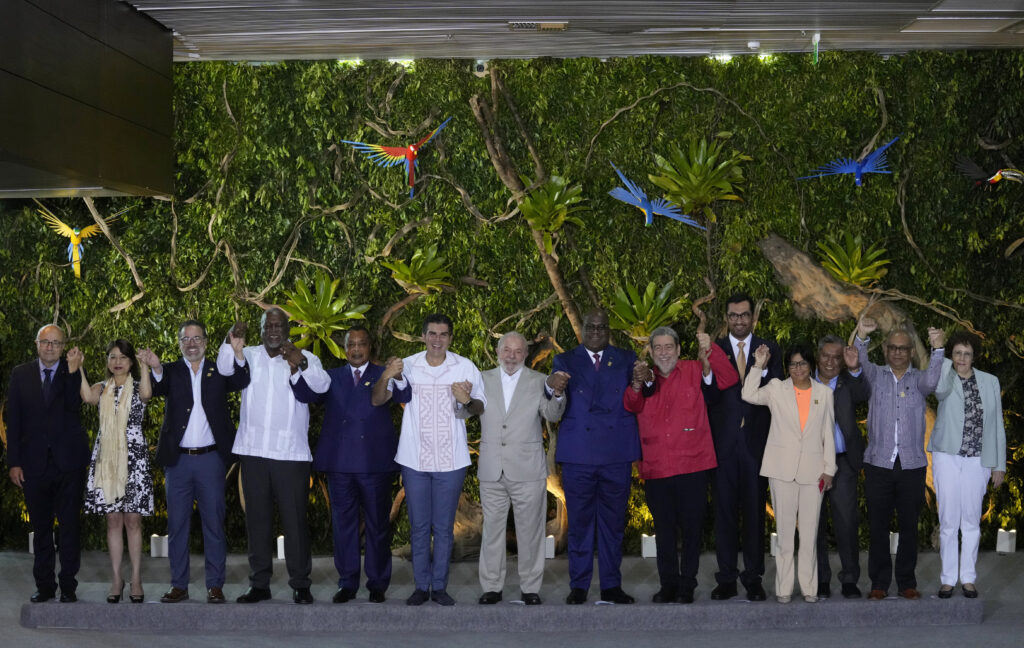By Letícia Duarte
As it is often the case with environmental agreements, the recent joint declaration signed by the eight countries to safeguard the Amazon rainforest is full of good intentions. But the absence of concrete goals against deforestation and climate change has upset environmentalists and local communities, who worry that these words may not translate into tangible action.
The pledges to protect the world’s largest tropical rainforest were announced at the conclusion of Brazil’s Amazon Summit held in Belém, the Capital of the Pará state and gateway to Brazil’s lower Amazon region, in early August. During the event, Brazilian President, Luiz Inácio Lula da Silva, vowed to work for “a new Amazon dream” after four years of an open anti-environmental agenda pushed by his predecessor Bolsonaro. Despite the optimism, the leaders of Bolivia, Colombia, Ecuador, Guyana, Peru, Suriname, Venezuela and Brazil could not agree on common goals and timelines to end deforestation.
Report For the World Brazilian corps members Fábio Bispo and Julie Pereira, from InfoAmazonia, and Aldem Bourscheit, from O Eco, who cover the Amazon, the communities who live there, and environmental issues across Brazil respectively, discussed the summit results and shared suggestions to reporters interested in holding authorities accountable. Their answers have been edited for length and clarity.
Report for the World: How do you see the results of the Amazon Summit? What was the main achievement and the main frustration?
Jullie Pereira: The Belém Declaration highlights important points where leaders acknowledge the importance of combating deforestation and reducing climate damage, taking into account indigenous peoples, women, and Amazonian communities. They mention the need to implement measures for climate justice, considering the diversity of each population.
However, they failed to establish a common goal. Brazil, in particular, avoided committing when it came to oil exploration in the Amazon. This was certainly one of the biggest frustrations for the peoples who constantly see their lands, rivers, and fish affected by the construction of large projects in the region.
Fábio Bispo: The fact that Brazil called for the involvement of eight Amazonian countries in a discussion about the importance of preserving the biome is quite positive and contrasts with the position we had in the past four years of the Bolsonaro government regarding forest preservation. The meeting can already be seen as preparation for COP 30, which will be held in 2025 in Belém. But it seems the government failed to calculate the interests that would be at stake in this meeting. The Belém Declaration, despite listing a series of good initiatives to protect the world’s largest tropical forest, does not establish clear commitments to stop illegal deforestation. In the end, the document is vague and offers few prospects for practical actions.
Aldem Bourscheit: The results of global conferences are commonly a series of frustrations, especially in the face of planetary crises such as climate change and biodiversity loss. I don’t see this one being much different.
Such meetings establish minimal foundations for actions that, converging from policies, budgets, and technical capacities of different countries, would lead to the necessary results within a certain timeframe. Therefore, it would be up to Brazil and other Amazonian countries, in particular, to unfold and amplify the outcomes of the Summit into government practices and other sectors related to the preservation of the biome. But at the same time, budget and financing gaps have historically exceeded environmental conferences (intentions.)
As for possible advancements, the event continued to consolidate the country’s political-diplomatic shift in the socio-environmental area, in a promising contrast to the past 4 years of the federal (mis)government.

RFW: How does this impact the local communities?
Pereira: There are many impacts of large-scale construction in the Amazon. We are talking about the impact of the Belo Monte dam, the TransAmazonian and BR-319 highways. The effects are inevitable, and such projects have contributed to polluted rivers, indigenous communities losing their fish and fisheries, altered cultures, increased invasions, increased deforestation, and the consequent worsening of the global climate crisis. During the summit, social movements held the “Amazon Free of Oil” march. Communities fear that more exploration or the construction of new large projects in the region will aggravate this historical problem.
Bispo: In the past two years, while exclusively covering climate issues and environmental policies involving the Amazon, we have been able to see up close how the issues affecting indigenous peoples, riverine communities and the environment itself depend on structural actions from governments, and here we are not only talking about the Brazilian administration.
These issues include major projects like the construction of the BR-319 highway and the Ferrogrão railway, which are already causing deforestation and violating indigenous rights, projects such as the installation of a potash mine in the Madeira River basin, which is within indigenous lands awaiting land demarcation for years, and the issue of illegal gold mining on indigenous lands that pollutes rivers and affects human health in the forest due to smuggled mercury from Bolivia, among others. None of these cases was specifically or structurally addressed by the summit in terms of stopping ongoing illegal activities and destruction.
Bourscheit: I believe that indigenous and traditional populations will benefit in general if public policies such as the demarcation of indigenous and Quilombola territories, settlement support, and support for family agriculture are reinstated. This has the potential to begin balancing the economic game in the Amazon, reducing the weight of legal and illegal production of commodities, gold, and diamonds. In this process, these populations may also benefit from less contamination of water and soil by pesticides, mercury, and other byproducts of rainforest degradation.
RFW: How do you plan to cover the topic going forward and hold the authorities accountable for what they promised or the areas left out in the pledge? What advice would you give to other reporters interested in covering the topic?
Pereira: InfoAmazonia monitors all these cases involving deforestation in the Amazon. I believe that from now on, it’s important for reporters to be more qualified to question and investigate the actions of companies intending to operate in the region, as well as to prepare themselves for discussions around the COP and the climate crisis. Personally, I am investing in courses and readings, and paying close attention to what the people of the Amazon are demanding and what is most concerning to them.
Bispo: There are many issues mentioned in the Belém Declaration, and I would highlight a special focus on the issues related to the Amazon Cooperation Treaty Organization (ACTO), which gained a decision-making body involving all eight presidents. Regardless of the commitments mentioned in the letter, we cannot forget that President Lula himself, when he took office, made commitments to the public and his voters to protect the Amazon and its peoples. The first months of his government were marked by the resumption of demarcations of indigenous lands, greater efforts in environmental inspections, and actions against illegal mining. However, there is still a lack of a clear government stance on more structural issues that will have direct impacts on the forest. I would say that these projects will require more intense and precise coverage.
Bourscheit: The path is to closely monitor the promises made in quantitative and qualitative terms and, above all, pay attention to the inconsistencies between the discourse and practices of regional policies and investments. Brazil is notorious for highlighting goals in national and international forums while working against them through public and private investments, direct and indirect.
We see this in the usual imbalance between public budgets allocated to agribusiness and family farming, for example, or to different sectors of the government working for Development and Environmental Protection. These discrepancies cause acute socio-environmental impacts, whose development deserves to receive permanent and international attention.

